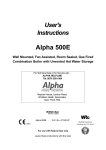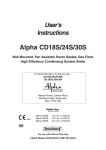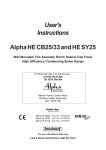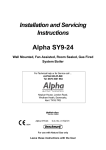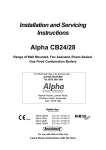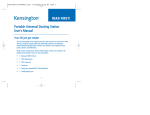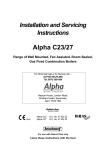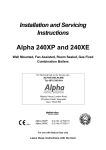Download C23-27 User Instructions - Alpha Heating Innovation
Transcript
User's Instructions Alpha C23/27 Range of Wall Mounted, Fan Assisted, Room Sealed, Gas Fired Combination Boilers For Technical help or for Service call ... ALPHA HELPLINE Tel: 0870 3001964 Nepicar House, London Road, Wrotham Heath, Sevenoaks, Kent TN15 7RS Service Listed Alpha C23 Alpha C27 G.C. No. 47 532 22 G.C. No. 47 532 23 For use with Natural Gas only Leave these instructions with the User 1 DESCRIPTION The Alpha Range of boilers are wall mounted, fan assisted room-sealed combination boilers, providing both central heating and domestic hot water at mains pressure. The Alpha C23 boiler is suitable for central heating loads of between 9.3 and 23.3 kW (31 700 and 79 500 Btu/h). The Alpha C27 boiler is suitable for central heating loads of between 11.0 and 27 kW (37 500 and 92 100 Btu/h). The boilers will provide central heating (as required) during the 'on' times set on your clock (if fitted). Hot water is always available whenever a hot tap is opened and takes priority over the central heating. The burner is lit electronically. 2 USER CONTROLS Fig. 1 3 BOILER CONTROLS 1. CENTRAL HEATING THERMOSTAT This thermostat controls the temperature of the water leaving the boiler for the heating system. For maximum output from the radiators the thermostat should be left at maximum i.e. fully clockwise. If lower heating temperatures are required, turn the thermostat anti-clockwise. 2. DOMESTIC HOT WATER THERMOSTAT This thermostat controls the temperature of the domestic hot water leaving the boiler. For maximum hot water temperatures the thermostat should be left at maximum i.e. fully clockwise. If lower temperatures are required, turn the thermostat anti-clockwise. 3. SELECTOR SWITCH This control allows the boiler to provide central heating and hot water or hot water only. Note: The internal clock and frost thermostat will not operate when the switch is in the vertical position, i.e. 'Off' position (0). 4. PRESSURE GAUGE This indicates the central heating system pressure. It should always be within the green band when cold, increasing slightly when hot. If the pressure falls below the green band, i.e. lower red area, contact your Installer to have the system checked and pressurised. 2 Alpha C23/27 5. INDICATOR NEONS When neon A (red) and neon B (yellow) are illuminated, the following conditions apply:Neon B Flashing very slowly (every 5 seconds) - Electricity supply to the boiler is on. B Illuminated continuously - Burner is alight. B Flashing on and off - Temperature sensor fault, contact your Service Engineer. A Flashing on and off - Overheat thermostat has operated. Rotate selector switch to the reset position (3) to reset. If this continues to happen, contact yor Service Engineer. A Illuminated continuously - Burner has failed to light. Rotate selector switch to the reset position (3) and the ignition sequence will restart after a delay of about 30 seconds. A and B Flashing on and off at the same time - Blocked flue or fan fault, contact your Service Engineer. A and B Flashing on and off alternatively - System pressure is very low and re-pressurisation is required. A Illuminated continuously and B flashing - Pump fault, restricted flow or DHW flow switch fault. 6. OVERHEAT THERMOSTAT This thermostat automatically switches the boiler off in the unlikely event of the boiler overheating. When the thermostat operates, the red neon (A) flashes on and off. Rotate the selector switch to the reset position (3) and the boiler will relight. If this continually happens, contact your Service Engineer. 7. PRESSURE RELIEF VALVE If the central heating system overheats and steam or water is discharged from the pipe connected to this valve, turn the boiler off and contact your Service Engineer. Your Installer should have shown you where this pipe terminates, usually outside your dwelling. 8. FROST THERMOSTAT The boiler has a built-in frost thermostat, which automatically operates the boiler if the water temperature falls below 8°C, providing the electrical supply is on. 4 LIGHTING INSTRUCTIONS Refer to Fig. 1 for boiler controls. 1. Ensure the following:a. Electrical supply to the boiler is off. b. All heating controls and thermostats are set to OFF or minimum position. c. All isolation valves at the bottom of the boiler are in the open position (slot on the spindle in line with the valves i.e. ). d. The gas and water supplies are on at the mains. e. The heating system pressure is within the green band as shown by the pressure gauge. 2. Switch on the electrical supply to the boiler. 3. Set any room thermostats to maximum and ensure that any clock is in an 'on' position. Refer to section 8, if a clock is fitted in the boiler control panel. 4. Set the selector switch to 5. Turn the hot water thermostat fully clockwise. Open a hot water tap, the main burner will light and the boiler will provide hot water. Close the tap and the burner will go out. 6. (central heating and hot water) and turn the heating thermostat fully clockwise. The main Set the selector switch to burner will light and the boiler will provide central heating. 7. Set the boiler thermostats, clock, external controls i.e. room thermostat to your chosen settings and the boiler is ready to operate. (hot water only). To turn the central heating off i.e. in Summer:- Set the selector switch to (hot water only). (hot water only). To turn the boiler off for short periods:- Set the selector switch to Note: In this position the pump will automatically operate for 5 minutes in every 24 hours. If the water temperature falls below 8°C the built-in frost thermostat will operate the boiler automatically until the temperature of the water in the heating system has been raised. To turn the boiler off for longer periods:- Switch off the electrical supply to the boiler. If required, all supplies i.e. gas, water and electricity may be turned off at the mains. If there is any possibility of the boiler being left during frost conditions, then the boiler and system should be drained and a label attached to the boiler drawing attention that the system has been drained. If this is required, contact your Service Engineer. Alpha C23/27 3 5 BOILER OPERATION (hot water The operating sequence of the boiler is controlled by the selector switch on the control panel. With the switch set to only) the boiler will only operate to provide domestic hot water, ideal for Summer use when central heating is not required. Setting the selector switch to hot water. (central heating and hot water) the boiler will operate to provide both central heating and If the boiler is operating to provide central heating and a hot water tap is opened, the boiler will automatically switch over to provide hot water. Such an interruption in the central heating should not generally be noticed by any reduction in room temperature. Note: If a clock is fitted to the boiler, it will only control the operating times of the central heating. Hot water will always be available when a tap is opened. When the selector is set to central heating and hot water, it will respond to a demand for heat in the following sequence:a. The pump will start, the fan will operate at full speed and the main burner will light. b. The output of the burner is automatically controlled to suit the system demand. c. When the temperature of the system water in the boiler reaches that set by the thermostat or the room thermostat is satisfied, the main burner is turned off and the fan stops after 20 seconds. The pump will continue to run to remove any residual heat from the boiler. d. When a hot tap is opened, the boiler automatically senses a flow of water. The fan will operate at full speed and the main burner will light. e. The boiler will continue to supply hot water at the temperature set by the thermostat until the tap is closed. 6 HOT WATER USE The supply of hot water is almost instantaneous at the boiler, but the time taken to reach a tap and the temperature at which it leaves the tap will depend on the rate at which the water is drawn off and the length of the pipe between the tap and the boiler. Fully opening a hot tap may not always provide the maximum temperature as the flow rate may be too high, try closing it slightly until the maximum temperature is achieved. The boilers are fitted with a seasonality valve which will automatically adjust the flow rate for both summer and winter conditions. Depending on your mains water pressure, it may not be possible to operate several hot taps at the same time. 7 USING A SHOWER Thermostatic or pressure equalising type - When using these types of shower set the boiler domestic hot water thermostat to maximum. The shower should then maintain a relatively constant temperature. Manual bath mixer type shower - When using this type of shower set the boiler domestic hot water thermostat to setting 7, This should avoid excessive temperatures at the shower. Note: If you get unacceptable temperature variations with this type of shower, then a thermostatic or pressure equalising type should be used. 8 IMPORTANT NOTES 1. BOILER LOCATION Always ensure the following clearances are available around the casing of the boiler (not including the bottom tray):Top: 220 mm, Bottom: 250 mm, Each side: 5 mm, Front: 450 mm Do not store any other articles in the cupboard containing the boiler and never place any clothing or combustible material on or near the boiler or flue pipe. 2. FLUE TERMINAL The terminal on the outside wall must not be allowed to be obstructed. If it is damaged, in any way, turn the boiler off and contact your Service Engineer. In cold weather, vapour may be emitted from the terminal. This is quite normal. 3. MAINS FAILURE In the event of an electrical supply failure the boiler will not operate. When the supply is restored, the boiler will return to normal operation. Remember to reset the clock when the supply is restored. If the mains water supply fails, there will be no hot water from the taps. The boiler will continue to provide central heating. 4 Alpha C23/27 4. ADDITIONAL BATHROOM FITTINGS Any equipment such as mixing valves, showers, bidets etc. must be designed to operate at mains water pressure. Contact your plumbing merchant or installer for advice when considering purchasing such items. 5. CLEANING Use only a damp cloth and mild detergent to clean the boiler outer casing. Do not use abrasive cleaners. 6. SERVICING To maintain efficient and safe operation of your boiler, routine annual servicing is essential. For advice on servicing contact:- The Alpha Helpline: 0870 3001964. 7. GAS LEAK If a fault or gas leak is suspected, turn off the gas supply. Do not touch any electrical switches, do not smoke and extinguish all naked flames. Contact your local Gas Region immediately. 8. ELECTRICAL SUPPLY The boiler requires a 230/240 V ~ 50 Hz supply, fused at 3 A if a 13 A 3-pin plug is used or a 5 A fuse if any other type of plug is used. To connect a plug:The colour of the wires in the mains lead of the boiler may not correspond with the coloured markings identifying the terminals in your plug. In this case proceed as follows:The wire coloured green and yellow must be connected to the terminal in the plug that is marked with the letter E, or by the , or coloured green or green and yellow. earth symbol The blue wire must be connected to the terminal which is marked with either the letter N or coloured black. The brown wire must be connected to the terminal which is marked with the letter L or coloured red. THE APPLIANCE MUST BE EARTHED. 9 GAS SAFETY REGULATIONS Current Gas Safety (Installation and Use) Regulations:It is the law that all gas appliances are installed and serviced by a competent person, i.e. CORGI registered personnel. Failure to install or service appliances correctly could lead to prosecution. It is in your interest and that of safety to ensure compliance with the law. The manufacturer's instructions must not be taken in any way as over-riding statutory obligations. The Benchmark Log Book must be fully completed by the installer on installation of the boiler. All CORGI registered installers carry a CORGI ID card and have a registration number. Both should be recorded in your central heating Log Book. You can check your installer is CORGI registered by calling CORGI on 01256 372300. 10 CLOCK (if fitted) The clock allows you to set the times at which the boiler will operate to provide central heating. It does not affect the supply of domestic hot water, which is always available whatever the setting of the clock. 1. TO SET THE TIME Tappets pushed to inside (off) Turn the outer dial clockwise to set the clock hands to the correct time. (Ensure the time indicator corresponds with the correct time on the 24hr dial as shown in Fig. 2, e.g. 3.00pm = 15 not 3). 4 5 6 7 9 8 13 12 11 OF Fp 14 9 10 I Time indicator 15 10.00pm (15 - 22) 5.00am (22 - 5) 8.00am (5 - 8) 3.00pm (8 - 15) 16 to to to to 17 3.00pm 10.00pm 5.00am 8.00am 3 0 Fig. 2 shows the clock set as follows:ON OFF ON OFF Tappets pushed to outside (on) 18 Select the OFF times by pushing the tappets in. 22 19 Select the ON times by pushing the tappets out. 23 12 20 2. TO SET THE ON/OFF PERIODS 24 21 NOTE: Do not rotate the dial anti-clockwise 1 2 3 Manual On/Off switch erio d Fig. 2 Alpha C23/27 5 3. MANUAL SWITCH The clock has a manual On/Off switch which operates as follows:Mid position Position I (right) Position 0 (left) Heating On/Off as set by the tappets Heating On continuously Heating Off continuously 11 FAULT FINDING FOR THE USER If you experience a problem of no heating or hot water, try to solve the problem by following the simple checks below before calling out a service engineer. 6 Alpha C23/27 Alpha C23/27 7 Alpha Therm Limited. Nepicar House, London Road, Wrotham Heath, Sevenoaks, Kent TN15 7RS Tel: 0870 3001 964 These instructions have been carefully prepared but we reserve the right to alter the specification at any time in the interest of product improvement. © Alpha Therm Limited 2003. email: [email protected] website: www.alpha-innovation.co.uk Manual compiled and designed by Publications 2000 - Tel: (01670) 356211 Part No. 1.019967 08/03/D166








